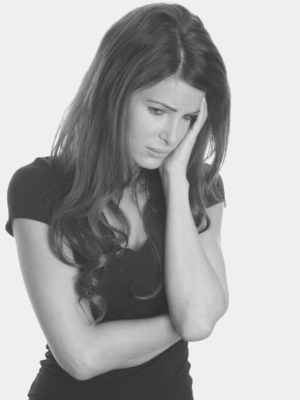What is depression?
Depressive disorder is an illness that affects the body (brain), mood, and way of thinking. It affects the way a person eats and sleeps. It affects how one values oneself (self-esteem) and the way one thinks. A depressive disorder is not the same as a temporary state of sadness. It does not indicate personal weakness. It is not a condition from which one can free oneself at will. People with a depressive disorder cannot simply say “enough is enough, I'm going to be fine”. Without treatment, symptoms can last for weeks, months, or even years. However, most people with depression can get better with proper treatment.

Types of depression
Severe Depression
Dysthymia
Bipolar Disorder
FAQs - Questions and answers
In our center, we combine psychiatric medical help and psychotherapy along with healthy lifestyle activities aimed at seeking emotional stability.
If you are interested in receiving information about our treatments and therapies for any type of disorder, please contact us by completing the form and we will provide you with all the necessary information from one of our psychiatrists.
Not everyone who is depressed or manic has all the symptoms. Some suffer from a few symptoms, others have many. The severity of the symptoms varies from person to person and can also vary over time. Below, we list some of the most obvious symptoms in each of the phases:
Depressive Phase
- Persistent sad, anxious, or “empty” mood.
- Feelings of hopelessness and pessimism.
- Feelings of guilt, worthlessness and helplessness.
- Loss of interest or pleasure in previously enjoyed hobbies and activities, including sexual activity.
- Decreased energy, fatigue, exhaustion, feeling “in slow motion.”
- Difficulty concentrating, remembering, and making decisions.
- Insomnia, waking up early or sleeping more than necessary.
- Weight loss, appetite or both, or conversely overeating and weight gain.
- Thoughts of death or suicide; suicide attempts. Restlessness, irritability.
- Persistent physical symptoms that do not respond to medical treatment, such as headaches, dizzy spells, nausea, vomiting, digestive disorders and other chronic pain. This ease of depressive disorder to surround itself with physical symptoms is what often makes it go unnoticed, being then treated as a masked depression and running the risk, therefore, of being treated as a physical disorder.
Manic Phase
- Abnormal or excessive euphoria.
- Distractability. Unusual irritability.
- Decreased need for sleep.
- Exaggerated self-esteem. Ideas of grandeur Excessive talk.
- Thoughts racing.
- Increased sexual desire.
- Excessively increased energy.
- Lack of judgment.
- Disinhibition, inappropriate behavior in social situations.
The manic phase of bipolar disorder is one of the few mental disorders in which the person does not suffer from their symptoms and cannot understand why others are trying to stop their condition, because the patient feels very good, full of energy. Critical capacity is almost nullified, no risks are foreseen and barely hoh impulse control.
The causes of depression are varied, and variables of a diverse order are involved. Biochemistry can help explain some cases. Depressed people show very high levels of cortisol (a hormone) and various chemicals that act in the brain, such as the neurotransmitters serotonin, dopamine, and norepinephrine. These levels may be elevated for hereditary reasons. Explanations given for the family origin of depression are that children receive a sad vision of the world due to the behavior of their parents, or growing up in an environment that is not totally nurturing.
From a behavioral point of view, depression is understood as the consequence of the lack of reinforcement or the lack of relationship between what the person does (his or her behavior) and the reinforcement they receive for it. Depression can be the result, consequently, of exposing the person to situations in which there is no control over the consequences of the behavior, thus entering the person in a state of hopelessness and defenselessness.
A series of inappropriate thoughts that the person maintains are also involved in the origin of depression, distorting reality in a negative way, such as: “to value myself positively, I have to achieve everything I set my mind to”/ “You can only be happy if the people I meet admire me”, etc. These mental schemes about oneself, the world and the future are generally rigid and unrealistic, and are usually formed by early childhood experiences, constituting a vulnerability factor for depression.
In addition, stressful life experiences, along with the person's coping ability to cope with them, as well as social support, can contribute to the development of this disorder. In short, when the conditions in which people's lives unfold are characterized both by the presence of negative events, as well as by the feeling of helplessness, the lack of meaning in life, and a negative image of oneself or a negative self-assessment, the chances of suffering higher levels of depression are significantly increased.
The first step in getting proper treatment for depression is a medical exam. Certain medicines, as well as some diseases, for example vital infections, can produce the same symptoms as depression. The physician must rule out these possibilities through a physical examination, patient interview, and laboratory analysis. If physical causes are ruled out, the doctor should perform a psychological evaluation or refer the patient to a psychiatrist or psychologist.
A good diagnostic evaluation should include a complete medical history. When did the symptoms start, how long have they lasted, are they that severe? If the patient has had them before, the doctor should find out if the symptoms were treated and what treatment they received. The doctor should also ask about alcohol and drug use, and if the patient has thoughts of death or suicide. Also, the interview should include questions about other family members. Has any relative had depression and if he was treated, what treatments did he receive and what treatments were effective?
Finally, a diagnostic evaluation should include a mental status exam to determine if speech, thinking, or memory patterns have been affected, as is sometimes the case with depressive or manic-depressive illness.
Selection of treatment will depend on the outcome of the evaluation. There are a wide variety of antidepressant medications and psychotherapies that can be used to treat depressive disorders.
In our clinic we offer a combined treatment: on the one hand at the pharmacological level, to obtain a relatively quick relief of the symptoms, and on the other at the psychotherapeutic level. We use intervention
